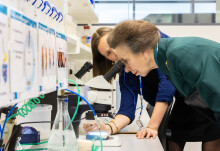

Matter of the heart
New heart treatment helps the body grow a replacement valve
Replacement heart valves that grow inside the body are a step closer to reality following studies led by researchers at Imperial.



New heart treatment helps the body grow a replacement valve
Replacement heart valves that grow inside the body are a step closer to reality following studies led by researchers at Imperial.


Blood pressure variability is a major predictor of heart attack and stroke risk
Changes to blood pressure over time could be used to identify patients at greatest risk of heart attack and stroke.


Digistain gains clinical data to support rapid breast cancer assessment method
Digistain, a company with its roots at Imperial, has proven the worth of its breast cancer assessment method in a significant clinical trial.


Imperial research breakthrough could spare brain cancer patients risky surgery
A simple blood test could help diagnose patients with the deadliest form of brain cancer, sparing them from undergoing invasive, highly-risky surgery.


Royal opening for new MRC Laboratory of Medical Sciences building
The MRC Laboratory of Medical Sciences has celebrated the opening of its new building at Hammersmith Campus with a visit from The Princess Royal.


Soaring childhood obesity from pandemic could cost UK billions
A major spike in child obesity levels during the pandemic could cost the UK over £8 billion, according to a study involving Imperial researchers.


Psychedelic therapy may help break the chains of gambling addiction
Researchers at Imperial’s Centre for Psychedelic Research are using brain imaging to understand addictions and devise new approaches to treating them.


Audio
Podcast: Best of 2023, sustainable flight fuel, and better bones
In this edition: 2023 in review, the first transatlantic flight using 100% sustainable aviation fuel, and improving bone quality.


Largest study of its kind shows leafy greens may decrease bowel cancer risk
Increasing the amount of folate through our diet or taking supplements could help to reduce bowel cancer risk.


Prostate cancer focal therapy is cost effective and may improve patient outcomes
Minimally invasive focal therapies for prostate cancer are associated with a lower overall cost and improved quality of life for patients.